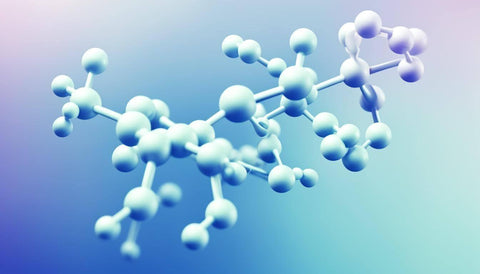Spermidine Supplement: A New Hope for Infertility?

Key Takeaways:
- Spermidine: A Natural Hope for Fertility: Spermidine, a natural compound found in various foods, shows promise in enhancing fertility by supporting healthy sperm and egg development, reducing oxidative stress, and improving overall reproductive function.
- Scientific Support for Spermidine: Emerging research suggests that spermidine supplementation may benefit both male and female fertility. Studies indicate its role in promoting better egg quality, improving sperm performance, and enhancing reproductive health in aging individuals.
-
How to Harness Spermidine's Potential: Incorporating spermidine into your routine, either through supplements like Just-Glow's Spermidine supplement or spermidine-rich foods, could be a game-changer in your fertility journey. Consult with your doctor for personalized advice on dosage and usage.
Spermidine and Infertility
Spermidine is a key player found in plant and animal cells, even in human semen. It takes part in stabilizing DNA, cell death, and fights inflammation. Many studies show that spermidine can help organisms live longer and keep their minds sharp as they age.
What is Spermidine?
Spermidine is a type of polyamine. It helps with DNA and protein building, cell growth, and the right amount of cell death. It's also believed to slow down aging and protect the brain from getting old.
Understanding Infertility
Infertility happens for many reasons, like getting older, changes in hormones, or genetic issues. This affects both women and men, making it hard to have children or stay pregnant. Figuring out what's behind infertility is the first step to finding the best treatments.
The Connection Between Spermidine and Infertility
New findings point to spermidine possibly helping with fertility problems, especially those tied to getting older. As mice age, their ovaries make less spermidine, leading to lower egg quality and fertility. But giving older mice spermidine boosts their ability to have healthy young.
These benefits also show up in pig eggs. This suggests we might see similar results in humans. Scientists want to work with fertility experts to learn more about how spermidine can help. If it works for people, adding spermidine to their diet might help older women get pregnant. It might also boost fertility in younger women.

|
Study |
Findings |
|
Phillips KP and Tanphaichitr IN (2008) |
Human exposure to endocrine disrupters can impact semen quality. |
|
Stewart AF and Kim ED (2011) |
Highlighted fertility concerns for aging males. |
|
Minois N, Carmona-Gutierrez D, and Madeo F (2011) |
Suggested a connection between polyamines and aging. |
|
Eisenberg T et al. (2009) |
Indicated that spermidine induction of autophagy promotes longevity. |
|
Deeb F, van der Weele CM, and Wolniak SM (2010) |
Demonstrated that spermidine plays a role in cell fate specification. |
|
Osborne HB et al. (1993) |
Considered the developmental importance of polyamine changes in early Xenopus embryos. |
|
Rubinstein S and Lax Y (1995) |
Showed a dual effect of spermine on acrosomal exocytosis in capacitated bovine spermatozoa. |
Scientific Evidence Supporting Spermidine for Infertility
Key Studies and Research Findings
A study in Nature Aging shows spermidine might help with age-related infertility. It found older mice had less spermidine in their ovaries. This was linked to worse egg quality and signs of aging in the ovaries. Studies also found spermidine is crucial for male fertility. It's in semen and affects the immune system. This might be connected to sperm quality.
Mechanisms of Action: How Spermidine Affects Reproductive Health
Spermidine affects reproductive health in many ways. It helps start a process called autophagy that recycles cells. This process is linked to living longer and better cell health. By adding spermidine to older mice’s diets, their eggs got better. This improved their chances of having babies. It also helps oocytes in pigs when they are under stress.
Comparative Analysis with Other Supplements and Treatments
|
Supplement/Treatment |
Mechanism of Action |
Effectiveness |
Potential Drawbacks |
|
Spermidine |
Autophagy induction, mitochondrial function enhancement |
Improved follicle development, oocyte maturation, and fertility in aged mice and pigs |
Lack of established dosage and treatment duration for human use, safety concerns |
|
NAD+ Repletion |
Restoration of NAD+ levels, protection against age-related fertility decline |
Shown to rescue female fertility during reproductive aging in studies |
Potential side effects and long-term safety not fully understood |
|
Assisted Reproductive Techniques (e.g., IVF) |
Bypassing natural fertility barriers, facilitating conception |
Declining success rates with advanced maternal age, particularly in women aged 44-45 |
Invasive procedures, high costs, emotional and physical stress for patients |
In vitro fertilization, also called IVF is often used for older women’s infertility. But, women 44 to 45 may have lower success rates. New methods with spermidine and NAD+ might help more. They show promise but need more studies. This will make sure they are safe and work well for people.

Benefits of Spermidine for Infertility
Studies show spermidine might help with infertility for both men and women. These insights could bring fresh hope to those facing fertility challenges. This natural compound offers several potential benefits for reproductive health.
Enhancing Male Fertility
Spermidine has shown a positive effect on male fertility. It's a type of polyamine that influences aspects of sperm performance. This includes motility, calcium signaling, and the acrosome reaction. Such aspects are key for male reproduction. Thus, spermidine could be an essential supporter of men's reproductive health.
Supporting Female Fertility
Research hints that spermidine might improve female fertility too. For instance, a study on mice found that decreased spermidine levels led to lower egg quality. Yet, giving spermidine to these mice boosted their reproductive success.
This improvement was seen in several key stages of reproduction. It included better follicle and oocyte development, and enhanced embryonic growth. What's more, similar benefits were found in pigs under stressful conditions. This suggests spermidine's role might extend to helping human reproduction under stress.
Overall Health Benefits of Spermidine
Spermidine isn't just linked to better fertility. It also offers wider health advantages. These include improved cell health, longer lifespan, and better aging. By boosting these aspects, spermidine may indirectly enhance reproductive health in men and women. It does this by fostering a healthier internal environment for pregnancies.
How to Use Spermidine Supplement
If you're looking into spermidine for fertility, here's what you need to know. It's key to know the right dose and how to take it safely. Supplementation with spermidine can boost your fertility efforts. But be sure to use it correctly and with other treatments if needed.
Recommended Dosage and Administration
The usual dosage is two capsules of our Just-Glow Spermidine supplement daily with food. It includes a spermidine extract from wheat germ, zinc, and vitamin B1 for reproductive health support.
Always read the product label and talk to your doctor before adding spermidine to your routine. This is even more important if you're getting other fertility treatments or if you have health issues.
Potential Side Effects and Safety Precautions
So far, there aren't any side effects tied to spermidine use. It comes naturally, either made by the body or found in food. Still, pay attention to how your body reacts. Stop using it if you have any adverse reactions.
If you're sensitive to certain foods, you'll want to know that our Just-Glow Spermidine supplement is free of lactose and added sugar. However, because it's derived from wheat germ, it may not be suitable if you're avoiding gluten. Talk to your doctor before starting any spermidine supplements, especially if you have health problems.
Combining Spermidine with Other Fertility Treatments
Adding spermidine to your fertility treatment can be good. More importantly, don't drop any fertility treatments your doctor has advised. If you're taking other fertility treatments, talk to your healthcare provider first. They'll make sure spermidine doesn't mess with or cancel out what you're already doing.
Knowing how to safely and effectively use spermidine means you can use it confidently in your fertility journey. This could up your chances of getting pregnant and enhance your reproductive health overall.
Natural Sources of Spermidine
Looking for ways to boost fertility naturally? You can find spermidine in many common foods. This includes wheat germ, cheeses like blue cheese, and mushrooms.
Soy products, legumes, and whole grains are also good sources. Nuts, seeds, and fruits like apples and mangoes make the list too. Including these foods in your daily diet can help keep you healthy.
Foods Rich in Spermidine
Top food sources of spermidine are easy to come by. They include well-known foods like aged cheeses and mushrooms.
Not to forget, legumes like peas, lentils, and chickpeas are great. So are various nuts and seeds, along with fruits and veggies. This makes getting spermidine from food a flavorful option.
Incorporating Spermidine-Rich Foods into Your Diet
Enhancing fertility might be as simple as changing up your meals. Try adding spermidine-rich foods to what you eat every day. Think about putting wheat germ in your smoothie or adding mushrooms to a stir-fry.
Even simpler, make a salad with nuts and leafy greens, or snack on seeds. Small diet changes like these can make a big difference. They ensure you're getting enough spermidine from your meals.
Conclusion
In conclusion, the spermidine supplement offers a promising new hope for those struggling with infertility, supported by growing scientific evidence and positive testimonials. By incorporating spermidine into your routine, either through supplements like Just-Glow's Spermidine supplement or spermidine-rich foods, you may enhance your chances of achieving reproductive health. If you're ready to explore this potential game-changer, visit Just-Glow for high-quality spermidine supplements and start your journey towards a brighter, fertile future today.
FAQ
What does spermidine supplement do?
A spermidine supplement promotes cellular health, supports longevity, and may enhance fertility by improving sperm and egg quality, reducing oxidative stress, and boosting reproductive function.
Are there downsides to spermidine?
While generally safe, some may experience mild side effects like digestive discomfort. It's always best to consult with a healthcare provider before starting any new supplement.
What is the best source of spermidine?
The best sources of spermidine are foods like wheat germ, soybeans, mushrooms, aged cheese, and legumes. For higher doses, consider a spermidine supplement.
Can you take spermidine every day?
Yes, spermidine can be taken daily. Consistent use is key to reaping its potential health and fertility benefits.
Is Spermidine Safe for Long-term Use?
Yes, spermidine is safe for long-term use when taken at recommended dosages. Always follow guidelines and consult with a healthcare provider.
How Quickly Can Spermidine Affect Fertility?
Spermidine's effects on fertility can vary, but some users report noticeable improvements within a few months. Individual results may differ based on health and lifestyle factors.
Summary
Infertility is a challenging journey, but there's new hope with spermidine supplements. Spermidine, found in foods, enhances reproductive health by supporting healthy sperm and egg development and reducing oxidative stress. Learn how spermidine could be a game-changer for fertility.





